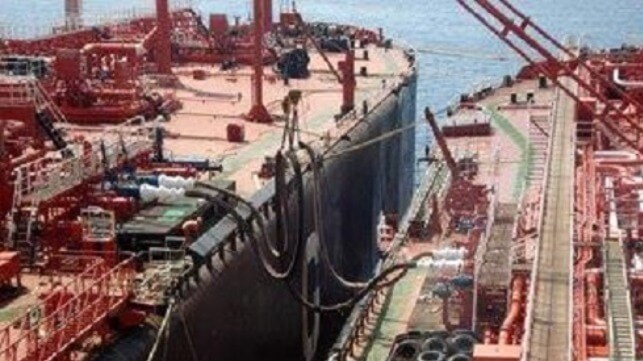Report: EU May Ban Tankers for STS Transfers That Violate Sanctions

As Russian oil producers look for ways to get their crude to new, non-Western markets, ship-to-ship transfers have become a go-to method. STS operations allow the smaller Suezmax tankers that serve Baltic ports to transload their cargoes to VLCCs for economical long-haul trips to Asia. Less legitimate STS transfers are used to obscure the origins of Russian oil and keep the trade hidden from the curious (except for the most advanced practitioners of tanker tracking). The waters of the Mediterranean off Ceuta and Kalamata are particularly notorious for these operations.
High-seas transfers are beyond the reach of coastal state regulation, but port states can still take action against tankers believed to be operating in violation of sanctions. The European Union is considering a plan to ban port access for sanctions-busting tankers which engage in transfers at sea, according to Bloomberg.
Citing an increase in "deceptive practices" and the related risk of pollution in the event of an STS transfer gone wrong, the European Commission has proposed that vessels linked to transload operations that violate the G7 price cap may soon be banned from EU ports. Spain has already attempted to take similar action on a limited scale.
Under the price cap, G7-domiciled shipping entities (owners, shipmanagers, insurers, class societies and other service providers) cannot enable the transportation of Russian oil priced above $60 per barrel. There is ample evidence of noncompliance in some jurisdictions, particularly in Pacific markets - often enabled by hiding activity and ports of call by disabling AIS. The EC has also proposed to ban tankers that turn off their AIS in order to discourage this practice.
Given the restrictions on Western players, Russian crude exporters have increasingly relied on tonnage without links to the G7. Dubai-based Sun Ship Management Ltd. operates the former Sovcomflot tanker fleet, and Indian owner Gatik Ship Management has grown its fleet from two ships to 58 in the span of a year on the back of Russian oil trading, making it one of the bigger names in crude tanking. Overseas owners like these have been buying up older ships, including vessels at or over the 20-year mark that normally marks retirement age for tankers.
These vessels are often insured through Indian or Russian P&I insurers (with questionable ability to pay out in the event of a major spill). Without any ties to the G7, these owners are free to transport Russian oil at any price level, without fear of an EU ban.
